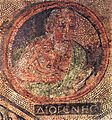4th century BC facts for kids
The 4th century BC was a time of big changes in the ancient world. It started in 400 BC and ended in 301 BC. This period saw the rise of powerful new empires and thinkers. Many famous people lived during this time.
Contents
Important People of the 4th Century BC
This century was home to many influential figures. They shaped art, philosophy, and politics.
Great Leaders and Thinkers
- Alexander the Great (356–323 BC) was a famous king of Macedon. He created one of the largest empires of the ancient world. His empire stretched from Greece to India. He spread Greek culture across many lands.
- Philip II of Macedon (382–336 BC) was Alexander's father. He was a brilliant military leader. Philip made Macedon a very strong kingdom. He united many Greek city-states under his rule.
- Demosthenes (384–322 BC) was a famous Greek speaker. He was known for his powerful speeches. Demosthenes often warned the people of Athens about Philip II.
- Xenophon (c. 430–354 BC) was a Greek historian and soldier. He wrote many books about history and philosophy. His writings give us a look into ancient Greek life.
Famous Philosophers
- Plato (c. 428–348 BC) was a very important Greek philosopher. He was a student of Socrates. Plato founded the Academy in Athens. This was one of the first universities. He wrote about justice, beauty, and good government.
- Aristotle (384–322 BC) was another great Greek philosopher. He was a student of Plato. Aristotle taught Alexander the Great. He wrote about almost everything. This included science, logic, and ethics.
- Antisthenes (c. 445–365 BC) was a Greek philosopher. He was a student of Socrates. Antisthenes is often seen as the founder of Cynicism. This philosophy taught that people should live simply.
- Diogenes (c. 412–323 BC) was a famous Cynic philosopher. He lived a very simple life. Diogenes believed in living naturally. He often challenged social rules.
- Epicurus (341–270 BC) was a Greek philosopher. He founded the school of Epicureanism. This philosophy taught that happiness comes from a calm mind. It also taught that pleasure is the highest good.
Talented Artists
- Praxiteles (active c. 370–330 BC) was a famous Greek sculptor. He was known for his beautiful statues. His works often showed gods and goddesses in a more human way.
Major Events and Changes
The 4th century BC was a time of big changes. The power of Greek city-states like Athens and Sparta began to fade. A new power, Macedon, rose to prominence.
The Rise of Macedon
Under King Philip II, Macedon became very strong. Philip built a powerful army. He used clever tactics to win battles. He slowly took control of many Greek city-states. His goal was to unite Greece.
Alexander's Conquests
After Philip II, his son Alexander took over. Alexander was a brilliant military leader. He led his army on amazing conquests. He defeated the mighty Persian Empire. His empire stretched across three continents. It went from Greece to Egypt and India. Alexander's conquests spread Greek culture and ideas far and wide. This period is called the Hellenistic period.
Developments in Asia
Far to the east, in China, new technologies were also developing. The Warring States period was ongoing. This was a time of many small kingdoms fighting. New weapons like the crossbow were used. These changes shaped the future of China.
Images for kids
-
A Han Dynasty Chinese crossbow from the 2nd century BC.
See also
 In Spanish: Siglo IV a. C. para niños
In Spanish: Siglo IV a. C. para niños
 | Kyle Baker |
 | Joseph Yoakum |
 | Laura Wheeler Waring |
 | Henry Ossawa Tanner |













